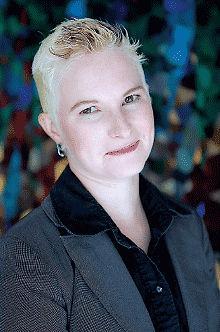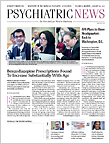The Association of American Medical Colleges (AAMC) wants future physicians to be competent and confident in caring for patients regardless of sexual orientation or gender identity.
A resource guide for educators and clinicians titled “Implementing Curricular and Institutional Climate Changes to Improve Health Care for Individuals Who Are LGBT, Gender Nonconforming, or Born With Differences in Sex Development (DSD): A Resource for Medical Educators” can be downloaded free from the AAMC website. The guide, released at the AAMC’s 2014 annual meeting in November in Chicago, was developed over a three-year period by the AAMC Advisory Committee on Sexual Orientation, Gender Identity, and Sex Development.
“We have known for a while that people who identify as LGBT face disparities in health care access and outcomes,” said advisory committee chair Kristen Eckstrand, Ph.D., a fourth-year medical student at Vanderbilt University School of Medicine who will be entering psychiatry residency this year. “Among the barriers has been the lack of education that physicians have received about LGBT health. We will perpetuate these disparities unless we teach the providers of the future how to care for these individuals.”
Eckstrand is founder and codirector of the Vanderbilt University Program for LGBTI Health (the “I” stands for “intersex”), which seeks to improve the care of LGBTI individuals through medical education as well as innovative community projects. She has a Ph.D. in neuroscience and says her career interest is in “the provision of patient-centered care to LGBT individuals, with an emphasis on affirming sexual orientation and gender identity as core concepts of all people and engaging in research around those issues.”
The AAMC effort is one in which psychiatrists have played a leading role. The nine-member advisory panel includes three psychiatrists—Brian Hurley, M.D., M.B.A., an addiction psychiatrist in Los Angeles (who is also the newest member of the AMA Section Council on Psychiatry; see
Psychiatric News, December 19, 2014); Scott Leibowitz, M.D., head child and adolescent psychiatrist in the gender and sex development program at the Ann and Robert H. Lurie Children’s Hospital of Chicago; and Andres Sciolla, M.D., a professor in the Department of Psychiatry and Behavioral Sciences at the University of California, Davis.
In interviews with Psychiatric News, Eckstrand and Hurley said psychiatry has long been at the interface between LGBT individuals and the health care system—historically as the profession that has pathologized variations in sexual orientation or gender identity, but more recently as the specialty that has helped to depathologize and destigmatize LGBT individuals.
They also said that LGBT individuals experience higher rates of mood and substance abuse disorders and have higher rates of suicide and suicidal ideation.
“There are people in our field who have a great deal of expertise when it comes to these topics,” Hurley said. “Psychiatry has a rich experience in LGBT health, and psychiatrists are well positioned to speak to the issues of minority stress, and increased risk for suicide and substance abuse disorders. This is in many respects our domain.”
Hurley said that prior to the AAMC effort, there had been no national set of medical education competencies to address the health of individuals who are or may be LGBT, gender nonconforming, and/or born with DSD. So institutions have lacked a standardized guide to direct curricular and institutional climate changes specific to these populations. This resource guide is designed to accomplish the following:
•
Provide education about the health needs of individuals who are LGBT, gender nonconforming, and/or born with DSD, as well as the role of academic medicine and the health care system in supporting these populations.
•
Support medical schools by discussing how to integrate this content into medical education, with a focus on the role of institutional climates.
•
Provide a framework to facilitate the assessment of learners, curricula, and institutions.
•
Highlight national resources and curricular innovations within academic medicine.
The resource guide includes 30 “competencies” modeled on the competencies already in place for residency education: patient care, knowledge for practice, practice-based learning and improvement, interpersonal and communication skills, professionalism, systems-based practice, interprofessional collaboration, and personal and professional development. Based on these, medical schools can design all manner of curricula to help their students—as well as residents—achieve competence.
“We built our competencies on an existing framework that extends into graduate medical education,” Eckstrand said.
The guidebook is divided into eight chapters: “Laying the Foundation for Inclusion and Equality”; “The Role of Medical Education and Health Professionals in Eliminating Health Disparities”; “Professional Competency Objectives for People Who Are or May Be LGBT, Gender Nonconforming, or Born With DSD”; “Integrating Competencies Into Medical School Curricula”; “Clinical Scenarios and Discussion Points for Experiential Learning”; “How to Assess Learners and Evaluate the Impact of Curricular and Climate Initiatives”; “Using AAMC’s MedEdPortal to Advance Curricular Change”; and “Future Directions.”
The AAMC MedEdPortal referenced in chapter seven of the guide is a cross-indexed suite of services that equips educators, administrators, and students in the health education professions with effective and efficient teaching and assessment resources. It serves as the online destination for identifying, developing, and sharing resources aimed at improving health education in support of providing comprehensive patient care for LGBT and DSD-affected individuals.
In addition to the guide, there is a video available, the first of what is expected to be a video series devoted to LGBT health.
The AAMC effort has already garnered publicity in the lay media. A recent issue of the Atlantic featured an article on the initiative. “Medicine has not traditionally been very kind to lesbian, gay, bisexual, and transgender people,” the Atlantic article began.
“While APA removed homosexuality from the Diagnostic and Statistical Manual of Mental Disorders (DSM) in 1973, attempts by doctors to ‘treat’ it persist even today,” the article continued. “Though research and understanding of LGBT health care has improved in recent years, the social stigma and discrimination faced by LGBT people lead to health disparities that put them at higher risk for certain conditions. This is also the case for those who are gender nonconforming or who are born with atypical sex anatomy.”
Eckstrand and Hurley emphasized that the AAMC resource materials are not exclusively for educators or students. Clinicians of every age and specialty are encouraged to make use of them. ■
The AAMC guidebook can be accessed
here. A video promoting the project is available
here.

